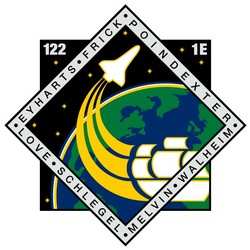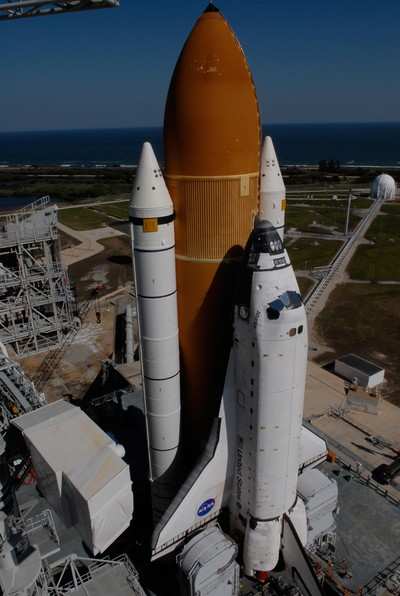 For the launch of space
shuttle Atlantis on the STS-122 mission, NASA managers are urging
all aircraft pilots and boaters to fully comply with the airspace,
bridges and waterway restrictions imposed around Kennedy Space
Center prior to and during shuttle launches and landings.
For the launch of space
shuttle Atlantis on the STS-122 mission, NASA managers are urging
all aircraft pilots and boaters to fully comply with the airspace,
bridges and waterway restrictions imposed around Kennedy Space
Center prior to and during shuttle launches and landings.
The first launch opportunity is Thursday, Dec. 6, with liftoff
scheduled for 4:31 p.m. EST. This launch time is approximately in
the middle of a 10-minute launch window. At NASA's request, U.S.
Air Force and U.S. Coast Guard surveillance aircraft will patrol
Eastern Range airspace boundaries on launch day. Violators will be
intercepted by patrol forces, thoroughly investigated and subject
to enforcement action by the Federal Aviation Administration. A
number of restrictions remain in effect around Kennedy during the
hours immediately following the launch of a space shuttle.
The following are restrictions that apply to pilots, boaters and
motor vehicle operators using the airspace, waterways, or roads and
bridges that lead to Kennedy.
Kennedy Space Center Area Aviation Restrictions
For the launch of Atlantis on mission STS-122, all restricted
areas surrounding Kennedy will be active and the area covered by
flight restrictions has once again been expanded for this
launch.
Due to international terrorist activities, heightened security
is essential to protect the space shuttle as a national asset. An
inadvertent unauthorized incursion into the area of the Cape
Canaveral Temporary Flight Restriction, or TFR, could cause a scrub
in the launch of Atlantis, the activation of airspace defenses and
an FAA enforcement action. Local pilots are asked to help NASA by
respecting these temporary but necessary restrictions so the launch
can occur on time and without incident.
The Eastern Range restricted airspace for Kennedy and Cape
Canaveral Air Force Station is in effect on a continuous basis and
is off limits to general aviation pilots. Access is limited to
official aircraft only. The restricted airspace normally covers the
area bounded by the Indian River to the west, Port Canaveral to the
south, the city of Oak Hill to the north, and three miles over the
Atlantic Ocean to the east. Pilots are encouraged to consult the
current FAA aeronautical chart for Orlando Class B airspace.
On launch day, these restricted areas will be expanded by the
TFR and will be activated seven hours before the launch window
opens. This will continue in effect until 30 minutes after launch,
after which the standard restricted areas for Kennedy and Cape
Canaveral Air Force Station will remain in effect. On Thursday,
Dec. 6, the TFR will be activated at 9:16 a.m. The launch is
targeted to occur at 4:31 p.m. within a launch window that extends
from 4:26 to 4:36 p.m.
The TFR will remain in effect until 5:17 p.m. If the launch is
scrubbed, pilots should check NOTAMs for the hours the TFR will be
in effect for the next launch attempt.
General aviation and VFR operations are prohibited within a
30-nautical-mile radius of Launch Pad 39A from the surface to (but
not including) 18,000 feet (located on the Melbourne VOR/DME
004-degree radial at 30.6 nautical miles). Among the public-use
general aviation airports affected within this area are Space Coast
Regional Airport and Arthur Dunn Airpark, both in Titusville, and
Merritt Island Airport on Merritt Island.
Within an airspace radius between 30 and 40 nautical miles, a
discrete transponder code must be obtained and clearance granted
from air traffic control before entering this airspace. Continuous
radio communications must be maintained.

Among the public-use airports affected within the 30- to
40-nautical-mile radius in which flight is permitted but under
positive air traffic control are Orlando International Airport,
Orlando Executive Airport, Orlando-Sanford International Airport,
New Smyrna Beach Municipal Airport, Melbourne International
Airport, Valkaria Airport and Massey Ranch.
Before flight, pilots should contact the St. Petersburg Flight
Service Station at 1-800/WxBrief (1-800/992-7433) for details of
the restrictions contained in the NOTAMs.
In flight, outside Orlando Class B airspace, pilots should
contact Orlando Approach control on 134.95. In the Melbourne area,
contact Orlando Approach control on 132.65. In southern Volusia
County, contact Orlando Approach control on 125.35. Flight Service
can also be reached locally by radio on the Titusville RCO at 123.6
or the Melbourne RCO on 122.6. Advisories will also be available
from the control tower at Space Coast Regional Airport at 118.9
megahertz.
 ANN's Daily Aero-Linx (04.15.24)
ANN's Daily Aero-Linx (04.15.24) Classic Aero-TV: 'No Other Options' -- The Israeli Air Force's Danny Shapira
Classic Aero-TV: 'No Other Options' -- The Israeli Air Force's Danny Shapira Aero-News: Quote of the Day (04.15.24)
Aero-News: Quote of the Day (04.15.24) Airborne 04.16.24: RV Update, Affordable Flying Expo, Diamond Lil
Airborne 04.16.24: RV Update, Affordable Flying Expo, Diamond Lil ANN's Daily Aero-Term (04.16.24): Chart Supplement US
ANN's Daily Aero-Term (04.16.24): Chart Supplement US




